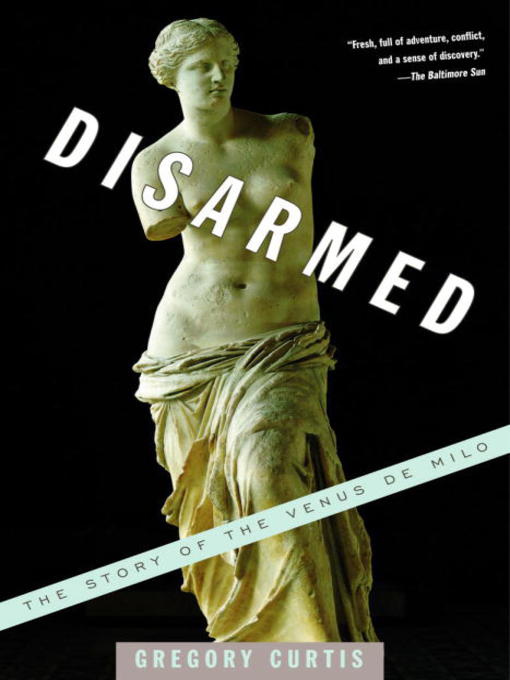From the flurry of excitement surrounding her discovery, to the raging disputes over her authenticity, to the politics and personalities that have given rise to her mystique, Gregory Curtis has given us a riveting look at the embattled legacy of a beloved icon and a remarkable tribute to one of the world’s great works of art.
-
Creators
-
Publisher
-
Release date
July 18, 2012 -
Formats
-
Kindle Book
-
OverDrive Read
- ISBN: 9780307483836
-
EPUB ebook
- ISBN: 9780307483836
- File size: 4057 KB
-
-
Languages
- English
-
Reviews
-
Publisher's Weekly
August 25, 2003
In 1820 on the island of Melos, a young French naval officer and a local farmer discovered the hulking halves of an armless statue. The Venus de Milo has since graced car advertisements, adorned matchboxes and inspired artists from Dalí to Jim Dine. Former Texas Monthly editor Curtis simply chalks up the Venus's omnipresence to its timeless beauty, and he impressively details an era when the statue seemed "less like a thing than an event." Relating how the French returned to Melos just in time to intercept a Russian boat bearing their treasure away, Curtis dismisses the mythic "fight on the beach" in which the Venus supposedly lost her arms; she had been found without them. Inspired by Johann Winckelmann's theories of Greek art, the Louvre's officials insisted on dating their acquisition to the classical age, rather than to the Hellenistic period of artistic decadence. Hence, the inscribed base that attributed the work to the Hellenistic sculptor Alexandros was conveniently "lost" for a time. For his part, Curtis ventures that the Venusonce stood in the niche of a Greek gymnasium and held an apple, symbol of Melos and of the debate that launched the Trojan War. But more compellingly, his sense of a good anecdote revives the myriad characters (often shown among the 21 illustrations) who furiously debated the statue's origin, identity and even placement in the Louvre as late as the 20th century. Such scholars exuded "an enthusiasm for the statue, almost a gratitude for its presence in their lives." This enthusiasm, Curtis's work suggests, is what museum-goers maintain and contemporary critics too often forget; his judicious book may push them to remember.
-
Loading
Why is availability limited?
×Availability can change throughout the month based on the library's budget. You can still place a hold on the title, and your hold will be automatically filled as soon as the title is available again.
The Kindle Book format for this title is not supported on:
×Read-along ebook
×The OverDrive Read format of this ebook has professional narration that plays while you read in your browser. Learn more here.

